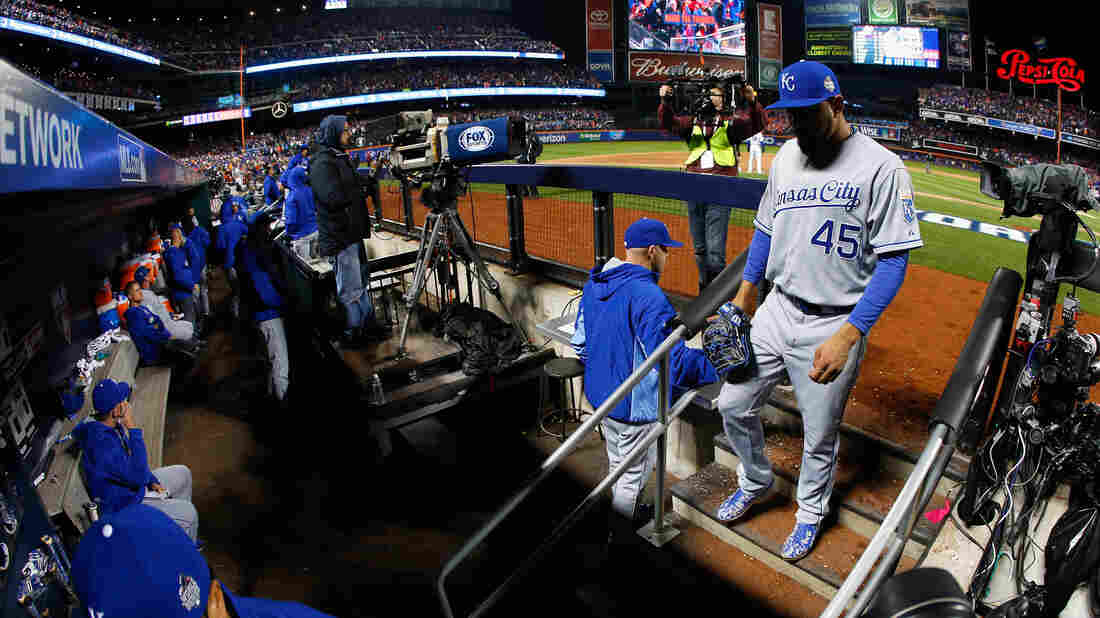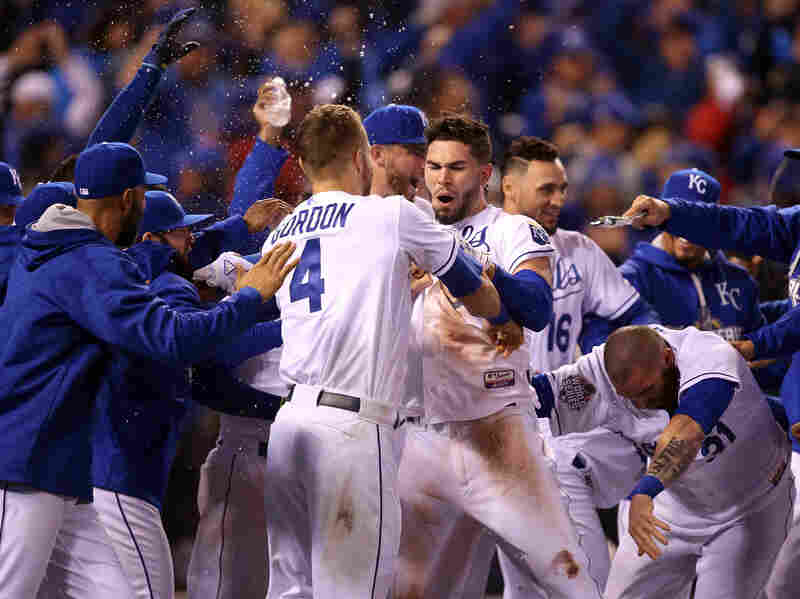Transcript
MICHEL MARTIN, HOST:
It’s time for our weekly visit to The Barbershop. That’s where a group of interesting folks gets together for a shapeup on what’s in the news. With us this week are Jimi Izrael, blogger and longtime member of The Barbershop. He joins us from WCPN in Cleveland. Hi, Jimi.
JIMI IZRAEL: How you doin’?
MARTIN: I’m good. And another old pro in The Barbershop today, Kevin Blackistone – he’s a panelist on ESPN’s “Around The Horn,” a sports columnist and a journalism professor at the University of Maryland. Good to have you back, professor.
KEVIN BLACKISTONE: Love to have the band back together.
MARTIN: That’s right, getting the squad – and a new voice joining us today – from NPR’s New York Bureau, Kavitha Davidson. She is a sports columnist for Bloomberg View. Make her welcome, gentlemen.
IZRAEL: Welcome…
BLACKISTONE: Hey, what’s up?
IZRAEL: …Have a seat.
MARTIN: That’s what’s up.
KAVITHA DAVIDSON: Hi, thanks guys.
MARTIN: All right, so we’re going to focus on some big sports stories this week, so let’s start off with some news. I’m talking about ESPN’s decision to reboot their website The Undefeated. It was supposed to be an offshoot of espn.com that focused on race in sports. And if you’ve never heard of it, well, it’s probably part of the reason for a major leadership change that was announced this week. Editor-in-chief Jason Whitlock is out. Kevin Merida of The Washington Post is in. And I’m going to start with you, Kevin, because you are an ESPN contributor. You’re also a good friend of Kevin Merida. Is this a big deal? And explain to people who might not be aware of it why this is a big deal, why so many…
BLACKISTONE: Sure.
MARTIN: …People who are involved in sports are talking about it.
BLACKISTONE: Well, it’s a big deal for Kevin because Kevin had just become managing editor at The Washington Post – first black managing editor of The Washington Post I might add – and for him to leave that post to take over this site at ESPN was a big deal for him. And it’s a big get for ESPN because they’ve really gone from having someone in Jason Whitlock who, unfortunately, did not have management in his toolbox and gotten someone who’s managing – who’s managed award-winning staffs at major newspapers, been an outstanding, award-winning journalist in his own right. And I think really when you look at the breadth of Kevin’s work, has really understood the nexus of race and culture and politics in this country and also has written at times about sports within that – within that soup as well.
MARTIN: But Kavitha, can I ask you this – some might argue why do you need that? Why do you need a site like that? I mean, shouldn’t ESPN be covering that anyway? What do you think?
DAVIDSON: Well, sure. I mean, I think that’s – that’s a legitimate question to ask. It was the same question that was asked when espnW launched about women’s sports coverage and covering sports from a woman’s point of view that these should just be things that are in the mainstream. And I think the hope for The Undefeated is that you get a little bit more support from the main site and you don’t kind of have, you know, these stories pushed to the sidelines because the coverage that they’ve done so far has been very minimal but has been excellent. The stories that they’ve put out have not been promoted enough, and, you know, that speaks to the inner turmoil, obviously. But I think that a site like this is also just necessary because, you know, you don’t – within a mainstream organization, you won’t have that kind of singular focus on these issues. And it’s really important to have a targeted voice, to have a coherent vision of where you’re going when you’re covering things like gender and race in sports. And, you know, hopefully the – you know, this new hire shows that they’re doubling down on that and they’re not just kind of relegating it to the sidelines.
MARTIN: Jimi, what do you think?
IZRAEL: Always worry when organizations get a black version of anything. It kind of gives them a reason to marginalize our voices in the regular content. You know, it becomes the black complaint box. It’s, like, well, if something black is happening, go to the black site. Don’t come here expecting that we’ll cover it. Go see what black people are talking about in the place where black people congregate. I’m always – I don’t like when organizations do it. I don’t like it that ESPN is doing it. And I think Kevin – respect – is a really heavy hammer for this particular job. I – his sports chops are present but light. And I also worry when organizations put these kind of heavy hammers in these places that don’t have a lot of experience in a certain – in what it is exactly that they do, that these people become easily controllable because sports isn’t your thing, so we’re going to – although this is probably not going to be Kevin, but I’m just saying – sports isn’t your thing, so we’re going to, like, try and help you out. So I’m a little worried.
BLACKISTONE: Yeah…
MARTIN: Interesting.
BLACKISTONE: Yeah, and that’s a…
MARTIN: Something to keep track of, interesting.
BLACKISTONE: Yeah, exactly, and that’s a legitimate concern. I think Kevin had those concerns when the conversations first came up. But I know that he got a lot of assurances about what it is he will be able to do there, and I’m very confident that he’ll do an admirable job at best, and a great job even better.
MARTIN: Well, it’s something to watch. So…
BLACKISTONE: Right.
MARTIN: …It’s something to watch. So moving on to a different story in the world of sports, allegations that the University of Louisville basketball recruits were brought to parties that included strippers and prostitutes who were hired by team officials. And this is based on reporting by ESPN. And now one of the assistant coaches has resigned, I think a day ago. The Louisville Cardinals are a legendary team. Their famous coach, Rick Pitino, who said he will not resign over this – gosh, jump ball here. Who wants to go first? Kavitha, you want to go first on this? What’s your take on it?
DAVIDSON: I’m really kind of surprised at the shock that everyone’s been expressing about this. Not just because, you know, it’s prostitution and money changed hands and I suppose that that’s really what makes this more salacious, but the sex part of it? This kind of thing has been going on. We’ve know that this is going on in terms of using women and their bodies as prizes for recruits to – in order to entice them. We’ve known about hostess programs where female students are kind of urged to, quote, “do what it takes” at parties and, you know, we’ve had a lot of sexual assault allegations come out of that. So this transactional relationship that we have with recruits, with high school boys, by the way, is something that has existed in the culture of the NCAA for decades. So the fact that people are kind of up in arms about it right now, I’m – you know, I’m glad that people are paying attention to it, but I would like to know where this outrage has been the last few years.
MARTIN: Kevin, you’re a professor, so that’s part of the reason I’m interested in talking to you about this. I – OK, call me stupid, but I don’t understand how that conversation even starts that you – what, do you approach a student – what is it? – and say go make sure this kid – I don’t even…
BLACKISTONE: Well, Kavitha’s actually…
MARTIN: I’m sorry.
BLACKISTONE: …Right. I mean, women as prizes for star athletes has been going on for a very long time. And I’ll also add it’s not going to stop because of this. But this is particularly salacious. And at a time when we’re talking about the trafficking of young girls into prostitution and to have this going on and have the – a mother who is prostituting her own progeny is not something I think we’ve really discussed. And even more, the other thing about this is people have to understand – you know, why is it that Rick Pitino can dig in his heels on this? Why is it that the athletic director is standing in his corner? Why is it that the university president of Louisville is saying nothing to the extent of let’s sit him down until this gets fixed because this is the number one most profitable college basketball team in the country. It brings in anywhere from $24 to $27 million in revenues to the University of Louisville. And if you’ve ever been to Louisville, where they play, the Yum! Center, is this sparkling brand-new facility in the heart of Louisville – not the campus, not the campus – in the heart of the Louisville the city. So that’s why this is a really, really big deal.
MARTIN: Jimi, final thought on that?
IZRAEL: Yeah. You know, I spent some time down there working for the Lexington Herald Leader. And let me just say, they take their basketball way, way, way too serious. They’ve got to get their priorities right.
MARTIN: Well, before we let you all go, we want to end on a lighter note. The Mets are going to the baseball World Series – jumping up and down, wooooo! – sorry, I’m sorry…
BLACKISTONE: All right, all right.
MARTIN: I’m done now. I’m sorry. I’m sorry. I am from Brooklyn. I may have mentioned that about 17 times, I don’t know, to each of you individually.
IZRAEL: Represent.
MARTIN: OK…
BLACKISTONE: Congrats.
MARTIN: …Kavitha, I understand that you’re a Yankees fan, so thoughts about this?
DAVIDSON: You know what? I am not from a time when there was a lot of animosity between Mets and Yankees fans, so I have no problem rooting for the Mets to do well. But it’s really great to see my Mets fans have something to cheer about after 15 years of having nothing to cheer about and having their ownership completely let them down, so this is really…
MARTIN: Oh, oh…
IZRAEL: Shots fired…
BLACKISTONE: Shade.
IZRAEL: …Shots fired.
MARTIN: I know, shade…
DAVIDSON: I don’t mean that to be a shot. I mean, you know, most Mets fans will tell you that it’s been very disappointing. And that – you know what? I’m a Knicks fan, so I’m also not a stranger to that feeling. So it’s a really great thing for New York, I think.
MARTIN: Kevin – Jimi, you’re in the land of teams that…
IZRAEL: Cleve…
MARTIN: …Teams that haven’t always won. I’m just trying to be nice. I’m trying to be a little nice about it – thoughts about this?
IZRAEL: Yeah. Well, as you pointed out, I live in Cleveland. And I’m only vaguely aware of this sport you call baseball. However, I do love an underdog. And so I’m on team Mets.
MARTIN: OK.
IZRAEL: Team Mets, baby…
MARTIN: All right, I feel good…
IZRAEL: …All day.
MARTIN: …About it. All right, Kevin?
BLACKISTONE: Well, I can’t support the Mets being a Nats fan. Andt the Mets absolutely destroyed the Nats this year, sweeping them twice…
MARTIN: Could you say that again, just so I could hear it?
BLACKISTONE: No, I cannot.
MARTIN: OK.
BLACKISTONE: You can play it back later on. But congratulations, have your fun now, best of luck.
MARTIN: OK, all right (laughter). I’ll leave it at, and someone else will be escorting you out. Kevin Blackistone is a panelist on ESPN’s “Around The Horn,” a sports columnist, professor of journalism at the University of Maryland. Jimi Izrael is a blogger, a longtime member of The Barbershop, with us from WCPN in Cleveland and Kavitha Davidson, sports columnist for Bloomberg View, with us from New York. Great talking to you all. Thank you so much.
IZRAEL: Yup.
BLACKISTONE: Peace, see you later.
DAVIDSON: Bye.
Copyright © 2015 NPR. All rights reserved. Visit our website terms of use and permissions pages at www.npr.org for further information.
NPR transcripts are created on a rush deadline by a contractor for NPR, and accuracy and availability may vary. This text may not be in its final form and may be updated or revised in the future. Please be aware that the authoritative record of NPR’s programming is the audio.




















